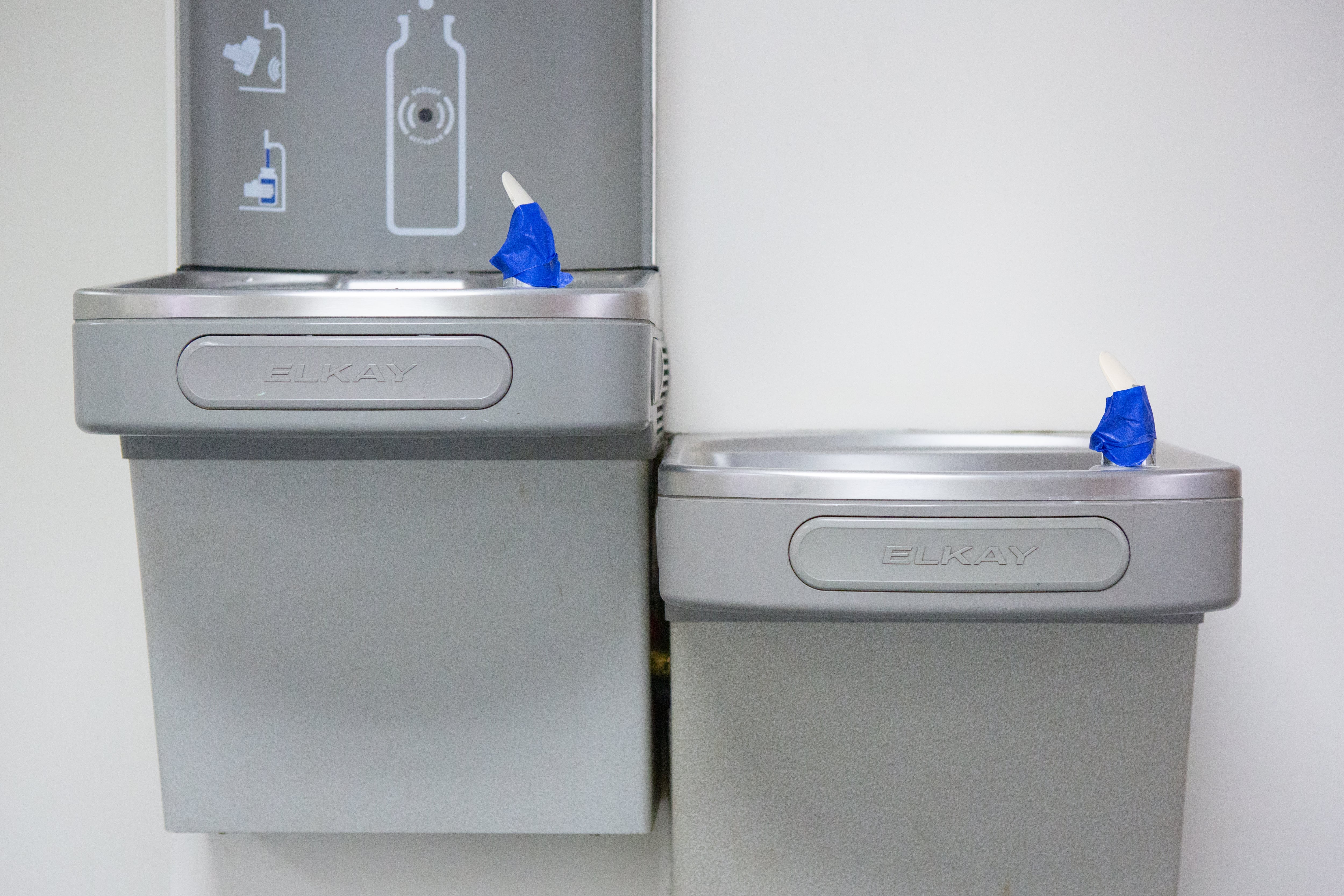Newark school board members have approved a nearly $5 million contract to purchase and install touchless water fountains across all district schools. At least half of water fountains have been inoperable in some buildings since the start of the school year, prompting students to carry jugs from home or go to teachers lounges in search of water.
The two-year contract was approved by district leaders during last night’s board of education meeting and comes after district plumbers tested water fountains across Newark schools and found some inoperable due to leaks from old ring filters and dry rotting, said board member Flohisha Johnson during the meeting.
“Water dispensers, coolers, and cups have been placed at locations where fountains require extensive repairs,” Johnson said, while giving an operations committee report during Thursday’s meeting. “Contactless water fountains continue to be installed districtwide.”
Last school year, Newark Public Schools said it kept all water fountains shut off as a way to curb the spread of the coronavirus when students returned to in-person learning. But Chalkbeat Newark found that the district shut off water fountains in the 2021-2022 academic year due to a delay in testing water sources for lead and getting water filters replaced. In March, Superintendent Roger León promised touchless water fountains would be installed by the time school started this fall but district officials on Thursday said the installations are ongoing.
The district’s school business administrator Valerie Wilson and district spokesperson Nancy Deering did not respond to questions about the number of touchless water fountains purchased and installed so far this year.
The contract approved by board members allows Ringwood-based company, Peter Hywel Plumbing & Heating, to supply and install touchless water fountains across the district. The $4,497,000 contract begins on Oct. 27 and ends on Oct. 26, 2024.
As of mid-August, the district had completed testing for lead at 57 schools, and planned to test 12 remaining schools before the start of the school year, meeting minutes show.
In September, Wilson said that more than 3,000 drinking water fountains had been tested for lead and back in use in September. But during the first month of school, some students said they still didn’t have access to functioning water fountains. Parents say they send their children to school with bottles of water for the day.
“I send my child with a big gallon to lug around with her so she can have water,” said Nadirah Brown, mom of a student at Harriet Tubman Elementary School. “There’s no bottled water provided nor water fountains for our children to drink from.”
At Newark Vocational, water fountains on the upper floors of the building were still turned off with missing filters as of Thursday, while fountains on the main level of the building were functioning properly, said an employee at the school who asked to remain anonymous for fear of retribution.
The school keeps water bottles in administrative offices for students, they said, but it causes disruptions during class time when a student needs to go in search of a water bottle.
“The school has been good about providing water bottles this school year, but having a water fountain in the hallway is very different than having to go wait on somebody or interrupt someone’s meeting so they can hand you a couple of bottles of water,” the source said.
But the lack of functioning water fountains isn’t an issue across the district.
Water fountains were turned back on in the spring at New Jersey Regional Day, a district school for students with severe disabilities, and new contactless fountains can be seen throughout the building, said a staff member at the school who asked to remain anonymous. The school, which has an enrollment under 200, provided students with refillable water bottles over the summer, the staff member said.
At Science Park High School, only about half of the water fountains are functional, according to a source at the school who asked to remain anonymous. And those that are turned on have low water pressure where water “tends to trickle out,” the source said.
The lack of easily accessible water can at times be dire at the school.
A teacher started to sell bottles of water from her classroom due to the water fountains being unreliable, the Science Park source said. There is also a vending machine that has water bottles for sale, but not all students can afford to pay for water, they said.
Recently, when a student visited one of the teachers’ lounges saying she had a headache and needed a drink of water, the teachers provided her with a cup of water from their water cooler, the source said. The lounges are usually equipped with water coolers but the jugs for the coolers aren’t always replaced immediately, they added.
“The fact that some kids are still buying water is definitely problematic and it’s something they shouldn’t have to do,” the source said. “It sort of becomes this situation where people have to scrounge around to look for water.”
Jessie Gomez is a reporter for Chalkbeat Newark, covering public education in the city. Contact Jessie at jgomez@chalkbeat.org.
Catherine Carrera is the bureau chief for Chalkbeat Newark, covering the city’s K-12 schools with a focus on English language learners. Contact Catherine at ccarrera@chalkbeat.org.






